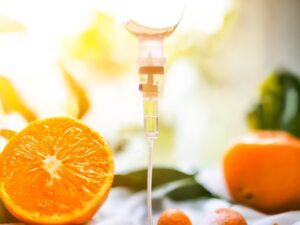If we could only offer one health tip or piece of wellness advice— regardless of age, gender, aesthetic goals, or lifestyle—it would be to STAY HYDRATED!
Sure, there are other important habits right up there with hydration, such as getting enough quality sleep and wearing sunscreen daily, but avoiding dehydration is crucial and surprisingly easy to fall into.
Even those who manage to meet daily recommendations can still be at risk of dehydration due to factors like activity level, climate, or certain medical conditions. Some studies and surveys suggest that a significant portion of the population, potentially up to 75%, may not meet optimal daily hydration levels, though the exact prevalence varies.
Hydration impacts everything from weight loss and skin health to energy levels, cognitive function, digestion, and more, and the effects of not drinking enough water can be life threatening. Every year, hundreds of thousands of people end up hospitalized—or worse, experience organ failure—all because of dehydration.
In this article, we hope to explain the importance of proper hydration, why drinking water alone probably isn’t enough for most people, and how IV hydration can be a powerful tool for keeping you hydrated and protecting your health.
The Importance of Hydration
Your body is made up of roughly 60% water, and it’s no exaggeration to say that water is quite literally… life.
To break it down:
-
- The brain and heart are composed of over 70% water.
- The lungs are over 80% water.
- The skin contains more than 60% water.
- Your muscles and kidneys are roughly 80% water.
- Your bones are about 30% water.
- Your blood is approximately 90% water.
- Your eyes are about almost 100% water.
- The cerebrospinal fluid that surrounds and protects the brain and spinal cord, is primarily water.
- Saliva and digestive fluids are mostly water.
Of course, these values are averages. They can vary slightly between individuals due to factors like age and health conditions. But yup, you are pretty much all water!
There aren’t many parts of your body that don’t rely on water to function properly. Even mild dehydration can interfere with key processes, leading to fatigue, headaches, poor concentration, and, in more severe cases, complications that can impact your overall health and well-being.
Here’s a closer look at how water supports your body:
Water Regulates Body Temperature
Water helps regulate your body temperature by redistributing heat from active muscles to the skin and facilitating cooling through sweating. Without proper hydration, your body struggles to dissipate heat, which can lead to heat exhaustion or even heatstroke.
Water Removes Waste
Your kidneys need water to filter waste and toxins from your blood, which are then converted into urine for elimination. Dehydration can impair this process, leading to a buildup of harmful substances in the body and an increased risk of kidney stones or urinary tract infections.
Lubricates Joints
The fluid surrounding your joints, known as synovial fluid, depends on water to stay effective. Proper hydration helps cushion and lubricate your joints, helping to prevent stiffness and joint discomfort.
Transports Nutrients to Cells
Water helps carry essential nutrients, vitamins, and minerals to your cells. Without enough hydration, this process can slow down, leaving your body without the resources it needs to function properly.
Maintains Organ Function
Vital organs like the heart, liver, and kidneys all require water to perform their essential roles. For instance, the heart needs proper blood volume—supported by hydration—to pump efficiently, while the liver relies on water to metabolize nutrients and detoxify the body.
Supports Brain Function
Hydration impacts cognitive functions like focus, memory, and problem-solving. Your brain depends on water to stay sharp. Even slight dehydration can cause brain fog, mood swings, and reduced mental performance.
Aids Digestion
Water is needed to break down food, dissolve nutrients for absorption, and keep the digestive tract functioning smoothly. Dehydration can slow this process, leading to issues like constipation and bloating.
Boosts Immunity
Water is essential for maintaining a healthy immune system. Proper hydration supports the immune system by aiding in the efficient transport of nutrients and removal of waste products, which indirectly enhances immune function.
Risks of Dehydration
Staying hydrated is not just about quenching thirst—it’s about giving your body what it needs to thrive and even stay alive! If you aren’t drinking enough water and consuming hydrating foods, your body has no way to maintain proper fluid balance, which can result in all sorts of health issues.
As noted earlier, dehydration is much more common than you probably realize. Most people are at least mildly dehydrated. In the short term, this might only cause minor issues such as thirst, hunger, brain fog, and fatigue. But chronic dehydration—even if it’s as simple as not replenishing fluids lost through sweat or daily activities—can have detrimental effects on your health.
Being dehydrated can potentially result in:
Headaches and Dizziness
Lack of fluids can lead to reduced blood flow and oxygen delivery to the brain, causing headaches and feelings of lightheadedness. Dehydration can also trigger tension in the muscles around the head and neck, further exacerbating discomfort.
Fatigue and Weakness
Without adequate hydration, your body will struggle to transport nutrients and maintain energy levels. This can leave you feeling constantly tired and sluggish. Dehydration also affects muscle function, leading to weakness and reduced endurance, making everyday tasks more difficult.
Issues Managing Weight
Sometimes you aren’t hungry… you are dehydrated! Not drinking enough water can lead you to confuse hunger and thirst signals, causing overeating when the body actually needs fluids. Additionally, dehydration reduces energy levels, making physical activity—and calorie burning—more difficult.
Dry Skin and Premature Aging
Hydration helps maintain the skin’s natural barrier, keeping it smooth, plump, and youthful-looking. When dehydrated, your skin loses moisture, leading to dryness, dullness, and a decrease in elasticity. This can accelerate the aging process and make any fine lines and wrinkles you already have more visible.
Without adequate hydration, your skin is also less able to repair itself, resulting in slower healing times and a higher risk of irritation or inflammation.
Weakened Immunity
Without proper hydration, your overall immunity is compromised. When dehydrated, your lymphatic system, which helps fight infections and remove toxins, can’t function as efficiently. This can weaken your body’s ability to fight off illnesses, leaving you more vulnerable to infections.
Dehydration also impacts the production of immune cells, making it harder for your body to produce the necessary defenses. Additionally, water helps transport nutrients to cells and flush out harmful waste products, both of which are essential for maintaining a strong immune response.
Constipation and Digestive Issues
Without enough fluids, you may experience bloating, indigestion, and irregular bowel movements, impacting overall digestive health.
When dehydrated, your body absorbs more water from the waste in your colon, making it harder for food to pass through. This can lead to constipation and discomfort. Additionally, dehydration can disrupt the balance of healthy gut bacteria, further affecting digestion.
Kidney Problems
Chronic dehydration places significant strain on the kidneys, making it harder for them to filter waste effectively. This can lead to the formation of kidney stones and urinary tract infections and, over time, can even cause kidney damage or failure in severe cases.
Additionally, dehydration can impair the kidneys’ ability to regulate electrolytes and maintain fluid balance, further compromising their function.
Heart Strain
Staying hydrated helps support healthy blood flow and reduces the strain on the cardiovascular system. When fluid levels are low, your blood becomes thicker, making it harder for the heart to pump blood through the body.
As a result, the heart has to work harder, which can increase the risk of high blood pressure, cardiovascular disease, and even heart attack or stroke. Chronic dehydration can also lead to an imbalance of electrolytes, which are essential for maintaining the proper rhythm and function of the heart.
Organ Failure
In severe cases, prolonged dehydration can lead to organ damage or failure, which may become life-threatening if not addressed promptly. In extreme situations, this can result in permanent damage to vital organs like the kidneys, heart, or liver, significantly impacting overall health and function.
Why Drinking Enough Water Isn’t Always Enough to Stay Hydrated
If drinking water alone were enough, wouldn’t the statistic that (at least) 75% of Americans are chronically dehydrated would be much lower?
Sure, we know that most people do not drink enough water or underestimate how much water they need to drink. But even for those who are confident they are drinking plenty of H2O, staying hydrated isn’t always as simple as it seems.
The reason? Hydration is about more than just water intake.
Dehydration can occur anytime you lose more water than you take in. Factors such as heat, humidity, physical activity, coffee or alcohol consumption, certain medications, sickness, an underlying health condition, and even stress can affect your body’s ability to stay hydrated.
Yes, stress! And who isn’t stressed from time to time? While not a direct cause, stress may contribute to dehydration through increased metabolic demands and reduced attention to fluid intake.
Stress also triggers the release of cortisol, a hormone produced by your adrenal glands. Over time, chronic stress can strain these glands, potentially impacting your electrolyte balance. To make matters worse, dehydration itself can exacerbate feelings of stress, creating a challenging cycle that’s tough to break.
Even general aging puts you at risk for dehydration because, as you get older, you can become less sensitive to your body’s thirst signals. So, you might think you are drinking enough when your body actually needs much more.
Drink water… lots of it! Just be aware that, for many reasons, water alone isn’t always enough to maintain hydration at a cellular level. In these situations, additional support like IV hydration can be a fast and more effective way to prevent and treat dehydration.
How IV Hydration is More Beneficial Than Drinking Water Alone
Whether you’re trying to maintain optimal hydration or are already dehydrated, one of the most effective ways to rehydrate is through intravenous (IV) solutions that contain a carefully balanced mix of fluids, electrolytes, and sometimes vitamins.
Of course, IV hydration should always complement drinking water, and if needed, you should address the root cause of your dehydration. But IV hydration is a very effective way to rapidly replenish the fluids and electrolytes your body needs.
Unlike drinking water, which must pass through your digestive system and be absorbed gradually, IV hydration delivers nutrients directly into your bloodstream. This makes it a faster, more efficient option—especially in situations where hydration needs are urgent or water alone isn’t cutting it.
Key benefits of IV hydration that make it a superior way to hydrate include:
Rapid Rehydration
IV hydration delivers fluids directly into your bloodstream, bypassing the digestive system for immediate absorption. This means your body can get the hydration it needs much faster than it can by drinking water alone, which has to be processed and absorbed gradually.
Electrolyte Replenishment
When you get IV hydration, the solution used also helps restore essential minerals like sodium, potassium, and magnesium. These electrolytes are crucial for muscle function, nerve signaling, and maintaining fluid balance—something plain water alone can’t effectively provide.
Customized Nutrient Delivery
IV hydration can include vitamins and antioxidants tailored to your unique needs, further boosting energy, immunity, and recovery. This customization makes it especially effective for those with specific hydration and nutrient needs that water alone can’t address.
No Digestive Delay
Unlike drinking water, which has to be processed through your digestive system before being absorbed, IV hydration delivers fluids directly into the bloodstream. This bypasses the digestive tract entirely, enabling faster hydration.
This can be especially helpful for those experiencing nausea, vomiting, or digestive issues that might make drinking water more difficult.
Enhanced Hydration for Critical Situations
For situations like extreme heat, physical exertion, illness, or dehydration from excess alcohol consumption, water alone often isn’t enough to replenish what your body loses. IV hydration can rapidly restore both fluids and nutrients, which is often needed in these scenarios.
Who Could Benefit the Most from IV Hydration
Avoiding dehydration is important no matter who you are, so anyone can benefit from IV hydration. However, some groups of people are more prone to dehydration or could face more extreme consequences should they become dehydrated.
IV hydration could save your health if you fall into any of these categories:
The Elderly
As we age, our body’s ability to retain water decreases, and thirst signals may become less reliable, making it harder for older adults to stay properly hydrated. Additionally, certain medications and underlying health conditions can further increase the risk of dehydration.
Individuals Who Work Outdoors
People who spend long hours outdoors, especially in hot or humid climates, face an increased risk of dehydration from sweating.
People In Physically Demanding Environments
Jobs that require heavy lifting or physical labor lead to increased sweat and fluid loss that can lead to dehydration.
Those Managing a Chronic Health Condition
Chronic conditions like diabetes, kidney disease, or heart problems can make hydration more difficult to maintain. IV hydration provides additional hydration support.
When Sick
Illness, especially when accompanied by vomiting, diarrhea, or fever, can significantly dehydrate the body. IV hydration can quickly replace lost fluids and electrolytes. This should not only make you feel better, but it could also help prevent further complications.
Active People and Athletes
Athletes and those who are frequently active tend to lose a lot of fluids through sweat during exercise. IV hydration supports faster recovery by replenishing fluids and essential nutrients.
Live in a Hot or Humid Climate
Hot climates increase the risk of dehydration because the body sweats more to regulate temperature, which causes a higher loss of fluids and electrolytes. If you are dealing with humidity it makes it harder for sweat to evaporate, reducing the body’s ability to cool down effectively.
Final Thoughts
We know it can be difficult to drink enough water, but staying hydrated is crucial for your body’s overall function and well-being.
While opinions on the exact amount of water to drink each day vary since factors like activity level, climate, and individual health all come into play, the general rule is to ensure you are drinking around 2 liters of water per day. However, if you struggle to meet your hydration needs through drinking water alone or fall into any of the categories discussed, you should consider options like IV hydration therapy.
IV hydration therapy can help both prevent dehydration and restore balance quickly and more efficiently, especially during times when you are ill, physically active, or exposed to extreme heat.
At Relive Health, we offer IV vitamin therapy with several tailored intravenous solutions formulated to provide unmatched hydration to rehydrate the body much faster than drinking water or electrolytes alone.
Use our clinic locator to find a Relive Health near you, and if you want to learn more about how IV Vitamin Therapy can help you, check out these articles:
Discover How IV Vitamin Therapy Can Help You




